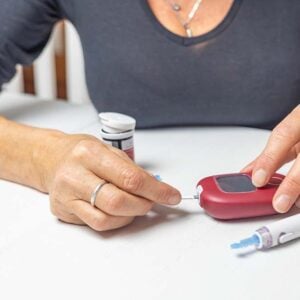
How to WIN the Battle of the Bulge
If you’re missing the sun right now, you’re NOT alone. February is prime time for the winter blahs.
The holidays are long over. The days are short.
And many folks are fighting low energy, irritability, and, maybe most irritating of all, THE MUNCHIES.
During the winter doldrums, folks pack on an average of five to seven pounds.
But lack of willpower ISN’T the culprit. It turns out the actual SEASON is to blame.
Keep reading to discover the surprising reason why and what you can do about it.
The shorter days don’t just make you feel different. They trigger literal changes.
The drop in natural light sends a message to your body to reduce the production of certain hormones and pump out more of others.
These hormonal changes aren’t as relevant today as they once were. But they’re intended to help prepare your body for the challenging winter months heading your way.
For example, men tend to produce more estrogen and less testosterone in the winter. And our cortisol levels typically peak in February.
And since our ancestors needed to bulk up to make it through the sparse winter months, your body pumps out more of the “hunger” hormone, ghrelin.
Ghrelin stimulates your appetite, so you gain weight while simultaneously feeling more lethargic, resulting in less calories burned. Plus, it makes you more likely to reach for starchy, calorie-dense foods.
This hormonal reaction could have been the difference between life and death for our hunter/gatherer ancestors who had to survive long, brutal winters.
The bottom line is winter weight gain ISN’T your fault. You’re not fighting your lack of willpower. You’re battling something even stronger. And that’s mother nature in the form of potent hormones.
But don’t give up. You CAN overcome your body’s ancient self-preservation mechanisms in this case.
The secret is simple. Spend more time outside!
It’s the lack of sunlight that spurs these hormonal changes. So exposing yourself to more bright light throughout the day can make a big difference.
For example, getting more morning sunlight helps reset your circadian rhythm, shifting the time for sleep earlier. As a result, you’ll end up eating LESS in the evenings.
Even indoor lighting makes a difference. One study found that people who ate in dim light consumed 39 percent more calories while eating in bright light led to better food choices.
Remember, you’re not controlling these types of decisions… your hormones are. So the best thing you can do to regain control of your weight is to take back control of your hormones.
In addition to getting more sunlight throughout the day, exercise (outdoors if possible) and spend more time in nature, exposing yourself to charged atoms that help heal your cells and combat stress.
P.S. Hormonal-triggered eating isn’t the only thing that could sabotage your weight loss efforts. Click here to read about these other troublemakers that have nothing to do with food.
Sources:
“Relationship between Seasonal Changes in Food Intake and Energy Metabolism, Physical Activity, and Body Composition in Young Japanese Women.” Nutrients. 2022 Jan 24;14(3):506. doi: 10.3390/nu14030506. PMID: 35276865; PMCID: PMC8838489.
“Circannual changes in stress and feeding hormones and their effect on food-seeking behaviors.” Front Neurosci. 2013 Aug 7;7:140. doi: 10.3389/fnins.2013.00140. PMID: 23966906; PMCID: PMC3735984.
Written By Dr. Richard Gerhauser, M.D.
For years he’s been the trusted doctor for celebrities, world-class athletes, and countless seniors looking to reclaim their health.
And now…for the first time ever… he’s making his medical breakthroughs available to readers all across America.
Dr. Richard Gerhauser, M.D. is one of the most pioneering and innovative minds in medicine today – and he delivers cutting-edge cures each month through his Natural Health Response newsletter.
Natural Health Response readers get full access to Dr. Gerhauser’s protocols for chronic pain… heart disease… diabetes… Alzheimer’s… and even cancer. These are the very same treatments Dr. Gerhauser recommends to his own patients at his practice in Tucson, Arizona.
In addition to being a board-certified medical doctor, Dr. Gerhauser has earned two master’s degrees and has served as a clinical professor at the University of Arizona.
And as a physician at the world-famous Canyon Ranch, Dr. Gerhauser treated celebrities from around the world who paid dearly for the type of next-generation health information he provides Natural Health Response readers each month.
View More Free Articles
The Bad Habit Robbing YEARS from Your Life
I often get eye-rolls when I stress just how essential lifestyle factors like light reducing pollution and grounding are good for health. But new research continually proves that I’ve been right all along. Today, a critical new study shows that something I’ve warned you about for YEARS is tied to a 34 percent increased risk […]
Reduce Colon Cancer Risk by 30%
More than 150,000 people are diagnosed with colorectal cancer yearly. Another 35,000 will get a liver cancer diagnosis. But if you have type 2 diabetes, your risk of developing one of these skyrockets—a 47 percent increased risk of colorectal cancer, and a two to three times higher risk of liver cancer. That’s why I’m excited […]
“Dinner Plate” Danger Raises Prostate Risk
Did you know that prostate cancer is FAR more prevalent in developed parts of the world than in less developed regions? Strange right? What is it about our modern, developed society that’s attacking our male population? There are MANY answers to this question. The primary one I will focus on today is a significant environmental […]
The 5-Minute Solution to Better Blood Pressure
Are you one of the millions who battle the so-called “silent killer” hypertension? And do you have five minutes to spare daily? If so, you could be well on your way to significantly healthier blood pressure. Sound too good to be true? A new study proves it. And the best part? It’s incredibly easy If […]
“Eye-Opening” Benefits of Pistachios
Imagine if there were a daily snack that could protect your vision. Well, a recent study brings good news for the 20 million U.S. adults already battling macular degeneration—the leading cause of vision loss for those over 60. Adding a handful of pistachios to your diet might help shield your eyesight. Let’s take a “look.” […]
Get Better Blood Sugar This Holiday Season
Let’s face it. The holidays are NOT good for your waistline… or your blood sugar levels. Potlucks, family dinners, cookie exchanges, Christmas parties… you know the drill. So, if you’re one of the 98 million people on the brink of type 2 diabetes, it’s VITAL to take steps to manage your blood sugar levels as […]
Common Vitamin Is a Hidden Colon Cancer Shield
With aggressive colon cancer on the rise in younger people, I’m always on the lookout for research showing how we can all lower our risks. Over the past few months, I’ve shared studies showing that stress, oral bacteria, obesity, and circadian disruption are all tied to colon cancer. And just last week I revealed how […]
Ditch Dieting for Better Blood Sugar Control
I’ll just say this right upfront… Type 2 diabetes is a lifestyle issue. And while diet is PART of the equation, it’s not the only thing to consider when managing your blood sugar. Over the past few months, I’ve highlighted research showing that factors like your bedtime and activity levels impact diabetes risk. Today, I […]
Slash Painful Nighttime Leg Cramps
On this Veterans Day, my team and I honor and thank all who have served in our armed forces. Your courage, sacrifice, and dedication to protecting our nation’s freedoms will never be forgotten. Not all health problems are life-threatening. There are plenty that threaten your quality of life. Nighttime leg cramps are one of them. […]
Life-Saving Fats Shield Against Cancer—Here’s How
The word “cancer” alone can stir up fear and worry, especially as we watch friends or family face its challenges. It’s one of the most brutal battles our bodies can go through. And prevention has never been more essential. While there are no guarantees, we have more tools than ever to reduce our risks. And […]










